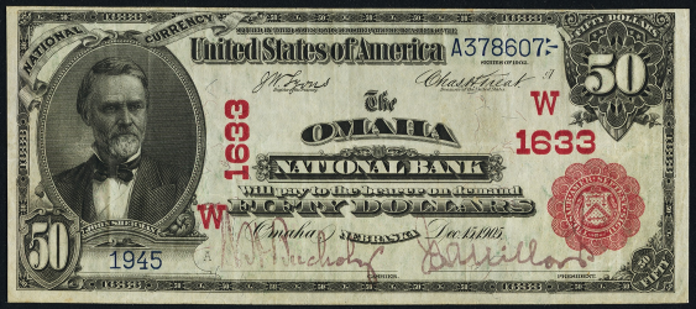Fifty Dollar Notes › Nationals › 1902 Fifty Dollar National Bank Notes › Pennsylvania Charters › 1902 $50 Saegertown Pennsylvania First National Bank
Get Value Now
| Item | Info |
|---|---|
| Series | 1902 |
| Charter | #11910 First National Bank of Saegertown, Pennsylvania |
| Year Chartered | 1921, 179 Banks Chartered |
| City Info | Saegertown is a borough in Crawford County, Pennsylvania, United States. The population was 997 at the 2010 census. It was established in 1824. "The settlement began at was is now known as Saegertown ca. 1795, when the brothers, Arthur and Patrick McGill, came to Woodcock Township. After Major Roger Alden built a sawmill in Saegertown, approximately 1800, the settlement was known for several years as Aldens Mill. In 1824, Daniel Saeger bought Alden's mill and adjacnt lands and at the age of 44, he laid out the town under its present name. Saeger, a native of Pennsylvania of German descent, left Egypt, Pa. in 1823 to find a suitable place to settle. After he arrived in Saegertown, he attracted to the area a large number of German Yeomanry from Lehigh and other eastern Pa. counties. Being active in the community, Saeger was an early member of the Lutheran Church, the owner of a sawmill and general store, and a justice of the peace. He was a member of the Pa. State Legislature." Source: Wikipedia |
| Similar Cities | City name is unique, no others like it. |
| Seal Varieties | Red, Blue |
| Other Info | 1. Value depends on notes known for charter, condition and market demand. |
| Neat Fact | Check your note's serial number. Serial #1 notes are valuable, even on common charters. Serial numbers 2-4 are also desirable in some cases. |
No Obligations Offers and Appraisals
Please submit a good photo or scan. It will be identified and evaluated. Understand there may be subtle differences between the image you see above and your note. Signatures, design, markings and note condition will determine the offer price. Notes in Uncirculated or better condition receive the best offers.
Appraisals can be estimated for wholesale and retail prices. Wholesale is what dealers typically pay. Retail is what a collector might pay. Retail is slightly higher in most cases.
Please visit this page for USA Paper Money Reference. Do not treat this page as a reference guide, it is for appraisal and acquisition purposes only.
